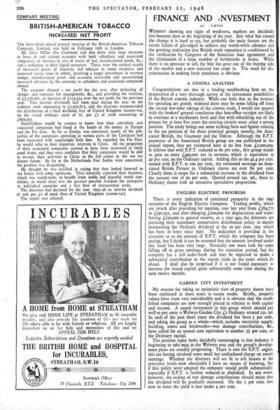FINANCE AND INVESTMENT .% - U WI 0 WrrHour showing
any signs of weakness, markets are decidedly less buoyant than at the beginning of the year. Just what has caused the change it is hard to say, but probably the main factors are the recent failure of gilt-edged to achieve any worth-while advance and the growing realisation that British trade expansion is conditioned by the ratification by Congress of the American loan agreement and the elimination of a large number of bottlenecks at home. While there is no pressure to sell, the bite has gone out of the buying side of the market and a new restraint has crept in. The need for dis- crimination in making fresh purchases is obvious.
A CINEMA ANALYSIS
Congratulations are due to a leading stockbroking firm on the preparation of a very thorough survey of the investment poisibilities of the British cinema industry. While one feels that as the avenues for spending are greatly widened there may be some falling off from the record war-time takings of the cinema trade, I would not quarrel with the brokers' general conclusion that box-office receipts are likely to continue at a satisfactory level and that with rebuilding out of the picture for at least five years the existing circuits must enjoy a strong position. The study brings out some striking facts and figures relating to the tax position, of the three principal groups, namely, the Asso- ciated British, the Gaumorst and the Odeon. Although the E.P.T. payments of the Associated British group are not published in the annual report, they are estimated here at no less than £2,000,00o. It follows that with E.P.T. reduced to 6o per cent., this group stands to gain an extra L490,000 net in revenue, which is equivalent to 4o per cent. on the Ordinary capital. Adding this to the 42.4 per cent. earned with E.P.T. at too per cent., the estimated earnings on Asso- ciated British Picture 5s. Ordinary shares are over 8o per cent. Clearly there is scope for a substantial increase in the dividend from the current rate of 20 per cent. Quoted around 24s. 9d., these 5s. Ordinary shares look an attractive speculative proposition.
ENGLISH ELECTRIC PROGRESS
There is every indication of continued prosperity in the 1945 accounts of the English Electric Company. Trading profits, which are struck after providing for taxation, rose last year from £584,773 to £591,031, and after -Charging £100,000 for depreciation and trans- ferring Doo,000 to general reserve,- as a year ago? the directors are pursuing their customary conservative distribution policy in merely maintaining the Ordinary dividend at the to per cent. rate which has been in force since 1937. No indication is provided in the accounts as to the:amount of E.P.T. which the company has been paying, but I think it Can be assumed that the amount involved under this head has been very large. Naturally one must look for some falling off in gross earnings during the transition period, but the company has a full order-book and may be expected to make a substantial contribution to the export trade in- the years which lie ahead. I shall also be surprised if it is not found necessary to increase the issued capital quite substantially some time during the next twelve months.
GARDEN CITY INVESTMENT
My reasons for taking an optimistic view of property shares have been explained in these notes in recent weeks. Briefly, property values have risen very considerably and it is obvious that the estab- lished companies are now strongly placed in relation to both capital and income. A sound' investment in this group which should pay well to put away is Welwyn Garden City Li Ordinary around 25s. 9d. In each of the past three years the dividend has been 5 per cent., and taking the groin, as a whole—which includes electricity supply, building, stores and brickworks—war damage contributions, &c., have called for an annual sum equivalent to another 34 per cent. on the Ordinary capital. The position today looks decidedly encouraging in that industry is beginning to take poor in the Welwyn area and the group's develop- ment plans are steadily progressing. There is also the E.P.T. meet, this tax having involved some small but undisclosed charge on recent earnings. Whether the directors will see fit to sell houses at the attractive levels now obtainable I have no means of knowing, but if this 'policy were adopted' the company would profit substantially. especially if E.P.T. is further reduced pr abolished. In any event. however, the ending of war damage contributions should mean that the dividend will be gradually increased. On the 5 per cent. rate now in force the yield is just under 4 per cent.






























 Previous page
Previous page